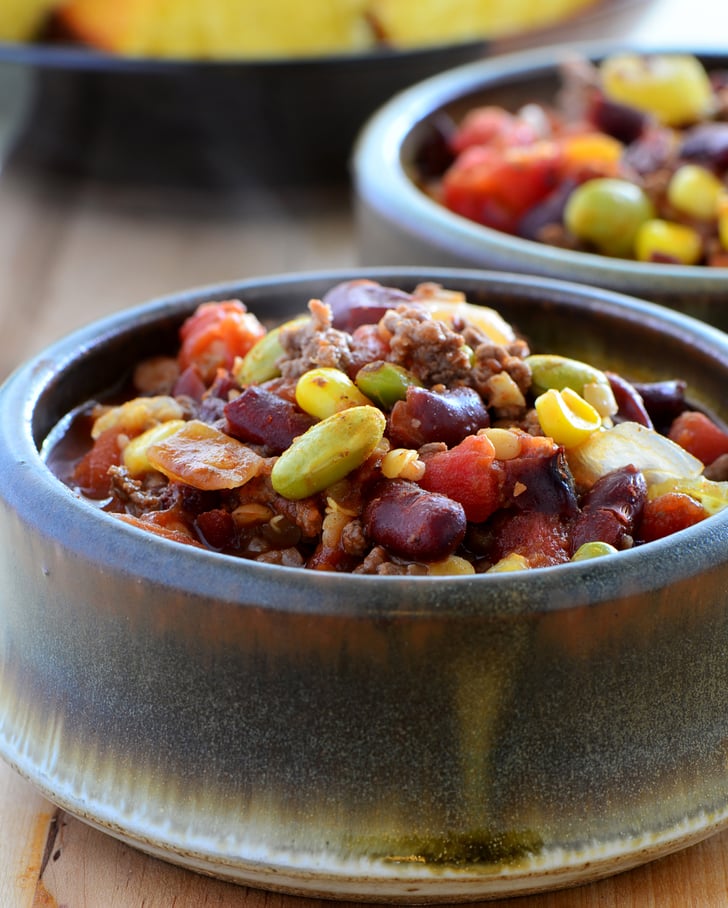If you’re worried about eating foods that cause gas, like broccoli, Brussels sprouts, beans, lentils, onions, and asparagus, we get it. Dealing with an uncomfortably bloated belly after eating can be painful, and the annoying issue of gas can be so embarrassing! The fiber and sugars in these foods can’t be broken down, so when they pass undigested into your colon, they get fermented by the good bacteria in your gut, causing gas as a byproduct.
This gas it totally normal, and the amount is different for everyone, but if you’re not used to eating these foods, they tend to cause more gas. You can also have a sensitivity to certain foods, such as dairy or wheat, which can also lead to gas. But that doesn’t mean you can’t ever eat broccoli, beans, or other fart-producing foods again. Here are ways to prevent the unwanted side effects when eating these foods.
Does Broccoli Cause Gas?
Full of fiber, these innocent green florets are much harder to digest when raw, so it’s best to lightly steam or sauté broccoli before you eat it. Enjoy just a few pieces at first, and you should notice an improvement in your tummy after eating. This can also be applied to other hard-to-digest cruciferous veggies, such as cauliflower, cabbage, kale, and collard greens.
Do Brussels Sprouts Cause Gas?
These mini cabbages are also part of the same family as broccoli, so they can have a similar effect, but sometimes can be even worse. They can be hard to digest because they contain a type of carbohydrate known as raffinose, which our bodies can’t digest. The bacteria in our large intestines break them down, and the byproduct is gasses such as hydrogen, carbon dioxide, and methane.
One way you can try to reduce the gas-producing effects is to boil them first, and then roast or sauté them. Eating sprouts with complex carbs like rice can also help, but the best suggestion is to introduce them into your diet slowly.
Does Asparagus Cause Gas?
Asparagus also contains fiber and the indigestible carbohydrate raffinose, so when they pass to the colon and are broken down by the bacteria, gas is an unpleasant, but normal side effect. Eating asparagus slowly can reduce swallowed air, which can help prevent gas, but also try pairing asparagus with a food that’s easy for you to digest.
Do Beans and Lentils Cause Gas?
Full of protein and fiber, chickpeas, black beans, kidney beans, pinto beans, and lentils can cause big trouble for sensitive stomachs. If you soak and cook your own beans or use dry beans in soup or stews, one way to prevent gas is to get rid of the water you soak the beans in (that contains some of the gas-producing enzymes) and fill your pot with fresh water before boiling.
Regardless of how you cook them, the best way to prevent gas is to start small. A serving size is usually half a cup, but you might want to start off with a quarter cup or even less. Choose beans with less fiber such as adzuki, black-eyed peas, edamame, and baby lima beans, and eat them with easily digestible foods like rice or quinoa. Avoid pairing beans with other foods that cause you digestive upset such as spicy peppers, onions, or dairy products. As your body becomes accustomed to eating beans, gradually increase the amount you eat.
Do Onions and Garlic Cause Gas?
Onions and garlic contain gas-causing fructans, and you may have more of a reaction to these foods when they’re raw, so try cooking them or using powdered onion and garlic instead. If those bother you as well, and you want the flavor without the flatulence, you can also try using the green part of scallions, and add oil-infused olive oil to recipes.
Do Pears Cause Gas?
Pears contain even more fiber than apples, which also tend to affect people’s digestive systems. Eating a plain pear for a snack can be uncomfortable, especially if you eat it peel and all. And while peeling fruits removes much of the fruit’s fiber and nutrients, it’s better to eat it peeled than to skip it altogether. (Baking a pear is another way to make this fruit easier on the tummy.) Enjoy a few peeled slices of pear with crackers or other fruits that are OK on your digestive system, such as bananas. Gradually increase your pear intake, and as your body becomes accustomed to digesting this fruit, you’ll be enjoying an entire piece in no time.
Does Dairy Cause Gas?
The lactose in milk products can cause major gas for some, so if this is your issue, you might be able to get away with choosing certain dairy products over others. Butter, hard cheeses, and cottage cheese tend to contain lower levels of lactose than a glass of milk or ice cream. It may also help to pair dairy products with easily digestible foods such as pasta, bread, brown rice, or fruit such as blueberries or bananas. Or if you love the taste of milk, mix half skim with half soy or almond milk, and pour that on your cereal. If you are severely lactose intolerant, eating any amount of dairy will send your tummy into knots, so it’s best to either avoid it or take Lactaid pills when eating from this food group.
